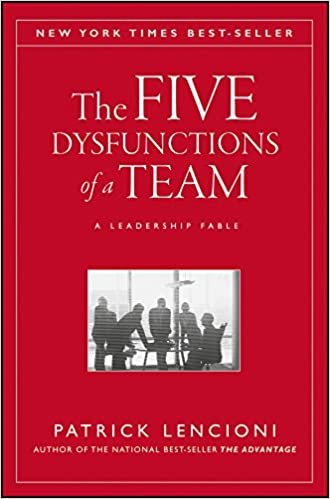The FIVE Dysfunctions of a TEAM – Patrick Lencioni
This post contains affiliate links that help supports this blog and cost you the exact same. If you do not wish to use affiliate links, then feel free to google the product.

Date Consumed: June 2022
You Should Read If: you are a leader or manager and looking to run a great team.
ISBN: 978-0787960759
The Book in Three Sentences
The Five Dysfunctions of a Team by Patrick Lencioni shows us the power of working together to achieve incredible work by focusing on the team’s missions above the goals of each individual.
We learn how the team can win, and thereby the company can win by overcoming these five dysfunctions: Absence of trust, fear of conflict, lack of commitment, avoidance of accountability, and inattention to results.
Finally, the book goes through several exercises to assess where your team is and how to overcome the dysfunctions.
Overview
The Five Dysfunctions of a Team hit home with many experiences I have had over the years. From the fantastic teachers and managers, I have had to the foolish mistakes I made in my journey of leading teams.
As an Engineering lead who has worked with hundreds (if not thousands) of different people through a multitude of projects, I can confidently say that the teams operating at the highest level have identified and overcome The Five Dysfunctions outlined in this book.
Lencioni introduces his core concepts and the Five Dysfunctions through a story. Two-thirds of this book is dedicated to telling a story about a Tech CEO that must quickly turn around a “great-on-paper” but highly dysfunctional executive team (a team full of many personalities we are all familiar with). By introducing the core concepts and expanding on them through a story, the book is enjoyable to read, and the principles are straightforward to understand.
The Five Dysfunctions
The Five Dysfunctions build on each other, with one dysfunction bleeding into and causing the next.

The five dysfunctions are:
1. Absence of TRUST: This first dysfunction is the base of the remaining four. When a team lacks trust in each other, it causes an unwillingness to open up about mistakes and weaknesses, leading to a fear of conflict.
An example of this would be a team member knowing they are out of their area of expertise, and instead of asking for help, they make an uneducated decision and hope it will be okay.
2. Fear of CONFLICT: When teams have an absence of trust, there is a natural fear of conflicts, and instead of debating ideas to get to the best solution, the teams will play it safe and agree with whoever holds rank (or is the loudest). Unfortunately, this results in the team’s lack of commitment to the agreed solution.
For example, a member in a different department will accept the game plan instead of voicing their concern that the plan will fail.
3. Lack of COMMITMENT: When there is no debate or conflict, team members will feel that their voice isn’t heard, and as a result, they will not commit to the decisions that were made. When there is no commitment to the path forward, the team members will avoid being accountable.
An example is when someone agrees to a task but does not keep it as a priority. They never make progress, and the entire team falls behind. All because there was a lack of commitment to the decision.
4. Avoidance of ACCOUNTABILITY: Seeing as the team did not commit to a clear plan of action, no one else on the team will call out peers that aren’t in line with the team’s direction. When people are not held accountable for their role in the team, results will slide.
For example, a team member may be performing at a low level, and instead of being held to the team’s standard, their behavior is allowed to slip, which will either encourage the other team members to reduce their performance or will create animosity.
5. Inattention to RESULTS: The top of the pyramid is the inattention to results and is the ultimate dysfunction of the team. This occurs as a result of the other four dysfunctions. Inattention to results is when team members solely focus on their own needs and not the collective team’s needs. This causes the entire team and the organization to become disjointed and unable to perform their best.
An example is when someone solely focuses on their small area and will not help anyone outside it.
Summary
I thoroughly enjoyed this read and gained insight on leadership that I will implement immediately with my team. This book showed me how vital these five dysfunctions are and how easily they can occur.
Key Takeaways
1. Teams must trust each other enough to give honest feedback, especially when it is negative. When teams don’t trust, they let concerns fester, which prevents productive progress and buy-in.
2. Team members must be held accountable and must hold others responsible for what is the agreed-on path forward. When people are allowed to fall short of their promises, it severely damages the team’s ability to execute.
3. Teams that are not focused on results do not win. Instead, they fail to grow, get beat by the competition and are constantly distracted by every possible task they can work on. More than anyone else, it is the leader of the team’s job to ensure everyone knows the main goal and the results they must achieve.
What I Am Going to Implement
1. Ensure my team builds trust with each other by better understanding who each person is and why they are the way they are.
2. Keep everyone accountable for the deadlines and deliverables they agreed on and understand the root cause when they are not met. Perhaps it was a lack of focus or too loosely defined scope, to begin with.
3. Be more attentive to the results. By ensuring everyone knows what we are trying to achieve, we can develop better processes for winning. Instead of letting teammates off the hook when something doesn’t work or get completed, I need to make sure everyone is focused on what is important and hold them to it.
Top 3 Excerpts
Excerpt 1
Not finance. Not strategy. Not technology. It is teamwork that remains the ultimate competitive advantage, both because it is so powerful and so rare.
Excerpt 2
Great teams do not hold back with one another. They are unafraid to air their dirty laundry. They admit their mistakes, their weaknesses, and their concerns without fear of reprisal.
Excerpt 3
Some people are hard to hold accountable because they are so helpful. Others because they get defensive. Others because they are intimidating. I don’t think it’s easy to hold anyone accountable, not even your own kids.








Thought-provoking! Just like the saying goes "no one can whistle a symphony. It takes a whole orchestra to play it.." 🙂
Thought-provoking! Just like the saying goes "no one can whistle a symphony. It takes a whole orchestra to play it.." 🙂